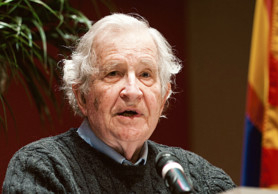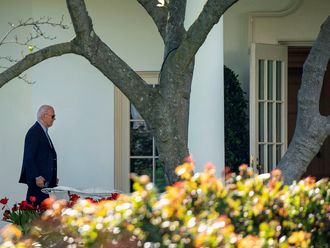
The American linguist, historian and thinker Noam Chomsky said that the administration of US President Donald Trump, despite all its talk about the so-called ‘Deal of the Century’ , has no solution to offer that could lead to the establishment of an independent Palestinian state. The Trump administration, he said, is only thinking of striking Iran.
“Israel will not be able to rely forever on American support,” Chomsky said in an interview with the Shahid Center and the “themfadhel.com” blog, adding, “The actions of Israel in recent years have alienated public opinion among the most liberal sectors and the youth, including the American Jews.
He said that the “support for Israel is increasingly based on evangelical churches and the predominantly nationalist and racist (anti-Muslim) party, where major institutions, especially the Presbyterian Church, have adopted boycott and divestment programs, with a focus also on American companies involved in the occupation.”
Chomsky also referred to Israel’s growing realisation of its strategic leanings. “A few years ago, Israeli strategic analysts realized that Israel can no longer rely on the support it receives from countries where there is some interest in human rights and [that] it must come closer to more reactionary and authoritarian sectors, a major change that has not taken years
Calling the situation in the United States “flexible”, Chomsky said “there can be positive changes in the future.”
Excerpts from the Q & A with Chomsky:
Q1: In your previous lecture with the Shahed center in 2016, you pointed out that the Oslo Accord was a “regenerated selling” for the Palestinian national rights, considering that the reference which the agreement was built on - which was decision number 242 - didn’t explicitly mention the Palestinians, but talked about solving the problem of refugees. As we are concerned about the historical review of the Palestinian struggle, and considering your assessment, how do you see the possibility of exiting this impasse?
Chomsky: The earlier Madrid negotiations broke down because the Palestinian delegation, led by Dr. Haidar Abdel-Shafi, insisted – quite properly – on termination of Israel’s policy of expanding illegal settlements. The US and Israel would not agree. The late chairman Yassir Arafat, undercutting the Palestinian delegation through the Norway channel, did not insist on this – in fact, insisted on almost nothing apart from the recognition of the PLO (nothing about the Palestinian Declaration of Independence, or anything else concerning Palestinian national rights).
After Oslo, Prime Minister Yitzhak Rabin initiated new settlement programs. The US and Israel quickly broke the Agreements explicitly by moving to separate Gaza and the West Bank. There were no steps towards Palestinian independence under Rabin or his successor Shimon Peres, who made it explicit, as he left office in 1996, that there could be no Palestinian state.
The first Israeli government to admit the possibility of a Palestinian state was the Benjamin Netanyahu’s administration that succeeded Peres. In response to a query by a journalist, David Bar-Illan, director of Communications and Policy Planning in the office of the Prime Minister Netanyahu, said that the Palestinians could call whatever Israel decided to leave to them “a state,” if they liked; or they could call it “fried chicken.”
Subsequent negotiations collapsed in ways that I cannot go into here, though the Taba negotiations in January 2001, called off by Prime Minister Ehud Barak, seemed to be making some progress, according to participants. The way out of the impasse is for Israel and its US backer to join almost all of the rest of the world in agreeing to an acceptable version of a two-state settlement based on the internationally recognised border (the green line), with fair and limited land swaps.
Q2: In the same lecture, you said that the two-state solution, or one whole binational state, were all solutions unacceptable to the Israelis, and that “there is no reason to worship the borders created by the imperialist powers”, and you linked this by talking about the binational state which you considered a fulfillment for the Zionist dreams in the great state of Israel. What do you think Palestinians should do about this situation? Is there another option?
Chomisky: In the short term, there are two options: (1) the international consensus on two states; (2) Israel’s program of creating a Greater Israel that integrates into Israel whatever it wants in the West Bank, leaving Palestinians in dozens of unviable cantons and under constant harassment, or worse. There is a good deal of talk about a “one-state settlement,” but that is highly unrealistic under current circumstances. Unlike (1), it has virtually no international support, and Israel is strongly opposed because it would pose the dreaded “demographic problem” (too many Arabs in a Jewish state). That problem will not arise under (2) as it is being implemented, by-passing and isolating Palestinian population concentrations and expelling Palestinians from the areas Israel intends to keep. One can imagine a process beginning with (1), followed by gradual erosion of the Israel-Palestine border (commercial, cultural and other contacts), leading to some form of federation and maybe on to true binationalism – which is not a “fulfillment of Zionist dreams” for the large majority of pre-state Zionists, but a position that had support from much of the Israeli kibbutz movement (Hashomer Hatzair), small groups of intellectuals (Brit Shalom), and some others farther to the left (Kalvarisky’s League for Arab-Jewish Rapprochement).
Along the way, the legitimacy of the borders should be questioned. They were, after all, imposed by Britain and France for their own interests, with no concern for the indigenous population. Now they are bristling with armaments, but that was not always so. In fact, in the early ‘50s, while hiking in northern Israel, I crossed the unmarked border by accident. Erosion of national borders can be salutary, as in post-World War II Europe.
The best hope for Palestinians now is to create pressures for a diplomatic settlement, cooperating with like-minded Israelis and supporters abroad. That has always been a priority for successful national liberation movements. The most important case is the US, and I think there are significant opportunities to bring about important changes in US policies.
Q3: With few differences in the comparison, do you see that the Palestinian struggle for national rights is akin to the struggle of people of South Africa against the Apartheid regime?
Chomsky: There are some similarities, but important differences too. The analogy is imperfect. Within Israel, there is severe discrimination, but it is not Apartheid. In the occupied territories, the situation is much worse than Apartheid. Israel basically wants Palestinians to disappear, the norm for settler-colonial societies (like the US, for example). South Africa, on the other hand, needed its Black population. They were the workforce. The Bantustans were horrible, but South Africa made efforts to sustain them and to gain international recognition for them. And the international situation is much different. Apartheid was strongly opposed internationally – arms embargoes, sanctions, boycott and divestment. Thirty years before the fall of the Apartheid regime, the South African foreign minister, recognising that the regime was becoming an international pariah, informed the US Ambassador, in effect, that they were relying on Washington to defend them against international opprobrium. And indeed Ronald Reagan was the last world leader to support the Apartheid state, though by then American opinion, and crucially US business, favoured overcoming Apartheid and government policy was beginning to shift. There was another crucial difference: Cuba. Cuba played a major role in liberating southern Africa, beating back the South African invasion of Angola and shattering the myth of white supremacy both within South Africa and in the surrounding regions. The situation with regard to Israel-Palestine is far different today.
Q4: The current US administration reported that there was a “bargain of the century” which began by declaring Jerusalem the capital of Israel. This doesn’t seem new since many previous American administrations had given comparable promises over the past decades. What are your expectations about the type of solution/s that Donald Trump and his administration are thinking about?
Chomsky: They haven’t given any indications, but their record suggests that if there is a plan at all – which is uncertain – it will probably be grotesque. The strategic goal of the administration, to the extent that one can extricate one from the chaos, is to firm up the developing coalition of Israel and Arab states and to join in confronting their common enemy, Iran, which is perceived as threatening US hegemony in the region and Israel’s freedom to resort to violence.
Q5: After US president Donald Trump declared the withdrawal of Washington from the nuclear agreement with Iran and the latter’s response (through statements by Iranian supreme leader Khamenei) to return to its activities in Uranium enrichment, and the successive Israeli strikes on sites in Syria, how do you see the impact of this regional tension? Especially since Iran cannot be exempted from its accountability in creating this tension, through its continuous interference in the neighboring countries, leading to less attention to the Palestinian issue?
Chomsky: Iran is no doubt seeking to extend its influence in the region, in the way all powers do. US aggression has created new opportunities for Iran in Iraq and Afghanistan. Iran is supporting the Assad regime, and Hezbollah in Lebanon. These developments are naturally regarded as unwelcome by the US, Israel and Gulf States, threatening their regional dominance. Even US intelligence agrees that Iran was living up to the nuclear agreement despite regular US violations. Trump’s withdrawal from the agreement does significantly heighten tensions in the region. It is unclear whether Iran will respond by returning to Uranium enrichment, though they are entitled to. If it does, US-Israel might present that as the pretext for a military attack, in addition to their cyberattack (an act of war, under US doctrine) and assassination of scientists. The consequences could be grim.
Q6: You mentioned also in your lecture [2016] that we should see the possibility of change in the American politics. In this context, you mentioned that the public support for Israel in the US was drifting towards the right. You also mentioned that a day might soon come where Israel would no longer be able to count on the support expected half a century ago? Current facts indicate the predominance of the populist right logic represented by Trump and a possible generic attack on the libertarian values not only in the US but in Europe too. What are the factors that can contribute to an expected change in the American society and in the American legislators?
Chomsky: It seems on the surface as though US support for extremist Israeli positions is solid, but that picture is misleading. Israeli actions in recent years have alienated public opinion among more liberal sectors and the young (including many Jewish Americans). Self-identified Democrats are now more sympathetic to Palestinians than to Israelis. Increasingly, support for Israel is based mostly on Evangelical churches and the nationalist and often racist (anti-Muslim) right. Major institutions, notably the Presbyterian Church, have adopted boycott-divestment programs, also focusing on US corporations involved in the occupation. Major human rights organisations have called for an arms embargo against Israel – and in fact, under US law (the Leahy Law) a strong case can be made for that. Much the same is true throughout the world. For some years, Israeli strategic analysts have recognised that Israel can no longer count on support from countries where there is some concern for human rights and must ally itself more closely with more reactionary and authoritarian sectors. That is a major change from not many years ago. The situation in the US is fluid, and there could be positive changes ahead.
Q7: American history showed is the ability to correct the imbalance as what happened, for example, in the 1920s with the persecution of Italian immigrants (its peak was Sacco and Vanzetti case), or getting out of the impact created by the McCarthyism era that lasted for two decades. Do you see that American society still owns this ability? As we are witnessing, the right-wing populist wave have become a growing stream on both sides of the Atlantic fuelled by (immigration, Islamophobia, fear of Russia and China)?
Chomsky: There is a good deal to say about the history, but putting that aside, while such tendencies are clear, it’s important to recognise that there are counter-tendencies too. The most popular political figure in the US, according to polls, is Bernie Sanders. His success in the 2016 elections was a sharp break from American political history, in which elections have been substantially determined by massive funding. Sanders had no support from the usual sources (corporations, great wealth), was ignored or denigrated by the media, and even used the scare word “socialism” (meaning social democracy). He probably would have won the Democratic nomination had it not been for machinations of Obama-Clinton party managers, and the popular movements spawned by his campaign, along with others, are having considerable success. There are similar developments in Europe (Corbyn’s Labour Party, Podemos, DiEM 25, and others). In general, centrist political institutions are collapsing in a prevailing atmosphere of anger, fear, and contempt for institutions, largely engendered by the regressive impact on the population of the neoliberal/austerity programs of the past generation. Such conditions often foster latent anti-social attitudes and exaggerated fears. For example, popular estimates of the number of immigrants are far higher than actual numbers, particularly in the US (much the same is true of estimates of foreign aid and of recipients of government benefits). The general circumstances bring to mind Gramsci’s words in Mussolini’s prison cells: “‘The crisis consists precisely in the fact that the old is dying and the new cannot be born.”
Q8: The Palestinians have developed a new way of struggling since 2015, which is the economic and cultural boycott campaigns led by movements (BDS). How do you see the Palestinian boycott movement that has achieved remarkable successes and represented a great existential concern for Israel and which pushed it to release threats to eliminate Palestinian leaders?
Chomsky: For the reasons I mentioned, unlike the South African case, the question of sanctions does not arise, yet at least; perhaps it will if matters progress successfully. So the real questions are boycott and divestment. These can be powerful tools. And as always for serious activism, it is necessary to think through carefully the impact of tactical choices. For the first time to my knowledge, a BD movement was launched 20 years ago by Uri Avnery’s Gush Emunim, directed against the occupation. The ‘BDS movement’ has become a major international campaign under Palestinian initiative since 2005, with many success and much promise. Experience has shown, I think, that focus on the occupation is the most effective tactic, the tactic that really concerns Israeli leaders and that can energise significant popular support, as in cases I mentioned earlier. The issues are clear and unambiguous, the stand entirely principled. The actions are not, as often happens, open to diversion away from the plight of Palestinians to side issues (academic freedom, double standards, etc.). They do not elicit backlash that sometimes overwhelms the actions undertaken. They could lead to policy changes, both in Israel and abroad, as they gain in force and scale.
Choice of tactics can surely be debated, but it is important to bear in mind that it should be debated. Choice of tactics should always be considered carefully in terms of consequences for the victims and opportunity costs – the course not taken and what it might have achieved. These are never trivial considerations. There is no room for dogmatism or inflexible doctrine. That much at least should be second nature to activists.















